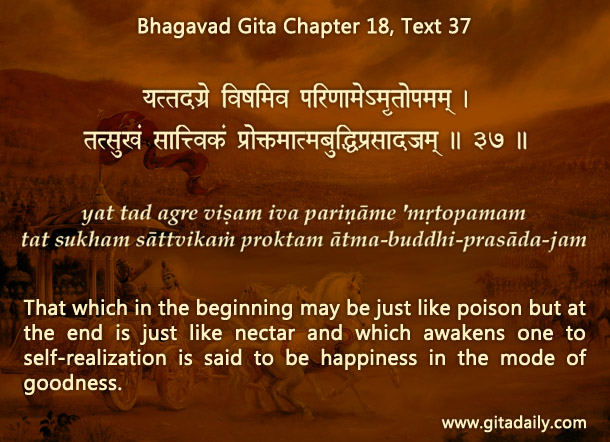Some people ask, “If God loves us, why does he interfere with our enjoyment?”
God doesn’t interfere with our enjoyment; he helps us infer what real enjoyment is. We often equate enjoyment with worldly pleasures, yet such enjoyment is short-lived. And the pleasure of physical gratification is available in all species of material existence.
Gita wisdom explains that we are eternal souls transmigrating through various species. In human bodies, the consciousness of the soul is uncovered enough to perceive and pursue eternal enjoyment. Such enjoyment is found in loving connection with the source of all enjoyment, the all-attractive supreme, Krishna. In fact, whatever worldly things we find enjoyable get their enjoyability from Krishna (Bhagavad-gita 10.41).
If we with our developed human consciousness crave physical pleasures, we are like children who keep playing with toys instead of studying. For something small, we end up losing something big. Krishna is like a parent who doesn’t want us to lose the opportunity for spiritual evolution just for the toys of worldly gratification.
To help us evolve spiritually, he provides guidelines through scripture. These guidelines are not deprivers of pleasure, but routes toward an evolved consciousness. For such evolution, we need to elevate our conception of what really matters in life. We need to let go of the temporary worldly things that tempt and trap our consciousness at the temporary material level. And we need to give due attention to the things that link us with our eternal Lord. Such evolution often requires us to experience poison initially so that we can relish nectar eventually (18.37)
If we learn to look for Krishna’s love not in his providing the resources for physical gratification but in his providing the resources for spiritual evolution, we will find that we are always loved.
Think it over:
- What is wrong with pursuing worldly pleasures?
- How can we evolve spiritually?
- How can we experience God’s love?
***
18.37 That which in the beginning may be just like poison but at the end is just like nectar and which awakens one to self-realization is said to be happiness in the mode of goodness.
To know more about this verse, please click on the image
Explanation of article:
Podcast:



Hare Krishna Prabhuji 🙏🏾🙏🏾
Absolutely heart touching insight !!! The ability to see through tough situations as opportunities for spiritual advancement is one of the best virtues we could strive to gain🙏🏾🙏🏾
I have said before and again mentioning that somehow whenever I am struggling with a question internally … Gita wisdom or spiritual scientist provides an answer just so aptly at that moment 🙏🏾🙏🏾At some point in time, please explain what’s the origin of the message you pick for the day .. how do you choose ? How does it every time end up providing insight at the right time and moment .
A big Hari bol
Thanks for your heartfelt appreciation. Grateful to be of service to you. Take care. Hare Krishna.